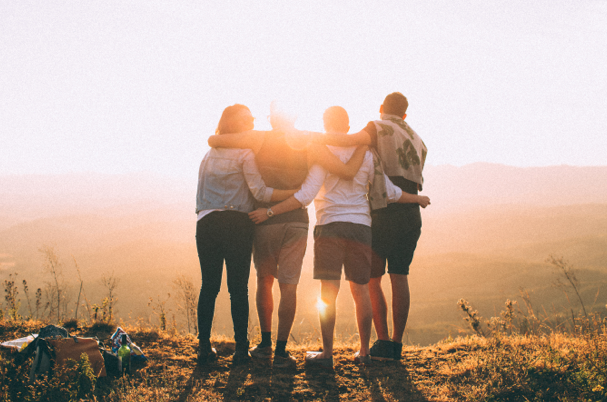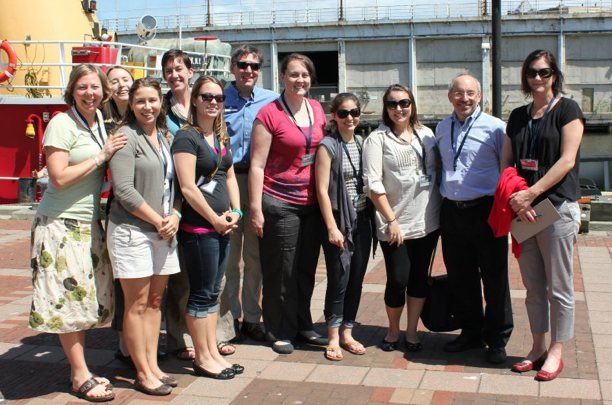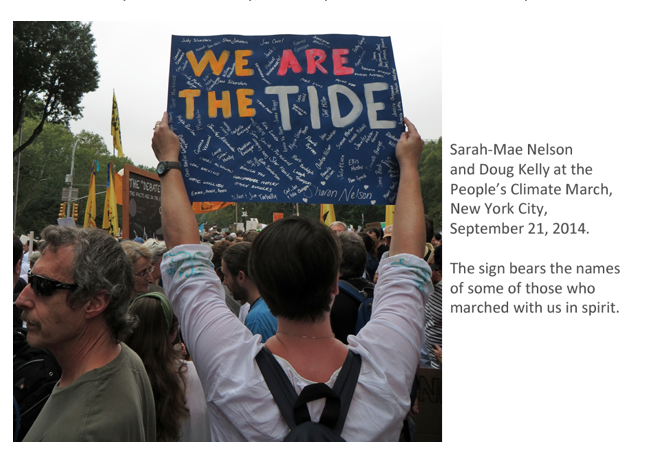My Community is My Hope #100HopefulDays

Today I turn 37 years old. This seems like an impossible number.
In my mind, I am a vibrant 21-year-old eager to make the world a better place. I see opportunities to make a positive difference everywhere. I am young, I am empowered, and I am unstoppable.
In reality, things might not always seem so rosy and, truthfully, some days I struggle with being overwhelmed. So how do I achieve—and maintain—this mental state?
I find my strength and my hope in my community.
I decided to pursue climate change communication as a profession in 2007 when the Fourth Intergovernmental Panel on Climate Change (IPCC) Report was released. I had known about climate change and its impacts on the ocean and planet since I could remember. I committed myself to a lifetime of conservation work when I was only ten-years-old, inspired by an article in Ranger Rick magazine, to use my talents to ensure the Earth does not end up as a pile of rubbish.
I am a marine biologist by training and an informal science educator by choice. I work at an Aquarium inspiring visitors to conserve the ocean. For the last 10 years, I have been a member of the National Network for Ocean and Climate Change Interpretation (NNOCCI) and the National Association for Interpretation (NAI). Every day I work with an amazing team of individuals who bring their personal passion and expertise to the frontlines of conservation. When I am having a bad day, there are at least 30 people I can turn to for encouragement or inspiration.

We depend on each other. My friends and colleagues come to me for answers to climate and ocean chemistry change questions. I go to my colleague Steve when I need help identifying a bird. I rely on Jadayah to help me stay abreast of what’s happening at the United Nations. Other friends share what’s happening at our National Parks.
On November 8, 2016 while teaching a class on the impacts of climate change on sustainable tourism, a student asked me, “Given what we are seeing unfold tonight, what hope do you have for combatting climate change?” My reply,
“Citizens will always be more powerful than presidents. The president is just one man. We are many. When we come together, uniting our voices, we have the power to change the course of history. It will not be easy, but if we persevere we will find our hope in action.”

One of the greatest moments of my life was participating in the People’s Climate March on September 21, 2014 in New York City. I was surrounded by over 400,000 people who all cared about what’s happening to our climate and who all knew we can make the choices for a better future. It was a day of solidarity and joy amidst the worry. I cried throughout the day, feeling intensely the connection to the thousands of people around me, and around the world, who stepped forward to take a stand.
I’ll be marching again April 29, 2017, in Washington, D.C. I look forward to meeting all who choose to join me.
More Blog Posts
 Rosemary Mosco: Climate IllustrationRosemary Mosco: Climate Illustration by Allison Arteaga, March 18 2019 A comic that circulated through social media this past month spread hope on climate change to thousands, and it was all inspired by the artist’s connections to the National Network for Ocean & Climate Change Interpretation (NNOCCI). “Climate Worries”, a cartoon by science [READ MORE]
Rosemary Mosco: Climate IllustrationRosemary Mosco: Climate Illustration by Allison Arteaga, March 18 2019 A comic that circulated through social media this past month spread hope on climate change to thousands, and it was all inspired by the artist’s connections to the National Network for Ocean & Climate Change Interpretation (NNOCCI). “Climate Worries”, a cartoon by science [READ MORE] National Network for Ocean and Climate Change Interpretation (NNOCCI) Impacts After 5 YearsNational Network for Ocean and Climate Change Interpretation (NNOCCI) Impacts After 5 Years by Sarah-Mae Nelson, MS, CIG/CIT, February 13 2016 Since 2009, the National Network for Ocean and Climate Change Interpretation—better known as NNOCCI—has been a collaborative effort to raise the discourse around climate change and ocean acidification. Led [READ MORE]
National Network for Ocean and Climate Change Interpretation (NNOCCI) Impacts After 5 YearsNational Network for Ocean and Climate Change Interpretation (NNOCCI) Impacts After 5 Years by Sarah-Mae Nelson, MS, CIG/CIT, February 13 2016 Since 2009, the National Network for Ocean and Climate Change Interpretation—better known as NNOCCI—has been a collaborative effort to raise the discourse around climate change and ocean acidification. Led [READ MORE] A Scientist’s Take On Communication TrainingA Scientist’s Take On Communication Training By Evelyn Beaury, August 27 2019 My lessons learned from NNOCCI’s keys to successful climate change conversations – let’s solve this together! With such a polarizing, politicized, and frightening subject, it’s easy to slide into contentious conversation when talking about climate change. I [READ MORE]
A Scientist’s Take On Communication TrainingA Scientist’s Take On Communication Training By Evelyn Beaury, August 27 2019 My lessons learned from NNOCCI’s keys to successful climate change conversations – let’s solve this together! With such a polarizing, politicized, and frightening subject, it’s easy to slide into contentious conversation when talking about climate change. I [READ MORE] California Marine Life Feeling the Heat of Climate ChangeCalifornia Marine Life Feeling the Heat of Climate Change By Lisa Marie Potter, February 18 2016 Monterey Bay is home to an astonishing array of marine life, from kelp forests to sea otters to migrating whales. The secret to its productivity: the California Current. Monterey Bay’s rich ecosystem naturally varies in response to physical changes in [READ MORE]
California Marine Life Feeling the Heat of Climate ChangeCalifornia Marine Life Feeling the Heat of Climate Change By Lisa Marie Potter, February 18 2016 Monterey Bay is home to an astonishing array of marine life, from kelp forests to sea otters to migrating whales. The secret to its productivity: the California Current. Monterey Bay’s rich ecosystem naturally varies in response to physical changes in [READ MORE] Of Penguins & Solar PanelsOf Penguins & Solar Panels by Billy Spitzer, August 28 2018 Here’s a surprising penguin fact: much like our own communities, African Penguins and the ecosystems they’re part of benefit from our transition away from fossil fuels and toward renewable energy. Like many people, we at the New England Aquarium believe in safeguarding people and [READ MORE]
Of Penguins & Solar PanelsOf Penguins & Solar Panels by Billy Spitzer, August 28 2018 Here’s a surprising penguin fact: much like our own communities, African Penguins and the ecosystems they’re part of benefit from our transition away from fossil fuels and toward renewable energy. Like many people, we at the New England Aquarium believe in safeguarding people and [READ MORE]